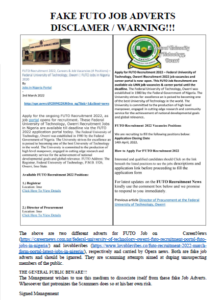I welcome you to the revised edition of the Mathematics brochure covering detailed information about the department and especially provide a reviewed curriculum to be covered by students admitted into the department to run programs in both Pure Mathematics and Industrial & Applied Mathematics Option. These subject areas are their accompanying concepts are central to all spheres of human developments. Its applicability and utilization cuts across all ages, cultures, creed and nations. Mathematics is the greatest scholarly manifestation that ever came out of the minds of mortal man. It is the most universal language understood and spoken by some of the most intelligent human beings.
Mathematics is a traveler par excellence and wherever it travels to, it leaves the youths with the hosts. These youths over the years have matured to become adults in their own rights. Thus, Mathematics as applied to Economics has produced the discipline called Econometrics. When applied to the social sciences, Mathematics produces a discipline called Statistics. When applied to the study of matter, Mathematics produces the discipline called Theoretical Physics, when applied to Biology and Medicine, Mathematics produces a discipline called Biometrics. When applied to environmental studies, Mathematics produces Mathematical ecology. When applied to Commerce, Finance, Insurance and Banking, Mathematics produces the discipline called Accountancy. When applied to Artificial intelligence and robotics, Mathematics gave birth to Computer Science. Indeed, all branches of Engineering are in fact Applied Mathematics, just to mention but a few.
The existence of internet and electronic mailing systems by which the world has actually assumed the status of a global village in terms of information dissemination is certainly a Mathematical creation. All these speak eloquently to the fact that a strictly mathematical mind is creative, logical, philosophical and constructive.
The department of Mathematics and Computer Science was one of the departments that came into existence in 1981 when the university went operational. Over the years, the initial components comprising of Mathematics, Computer Science and Statistics have become separate departments and what is left now is called the DEPARTMENT OF MATHEMATICS. Today, the department has grown from strength to strength in all its constituent programmes consisting of Pure Mathematics and Applied & Industrial Mathematics.
The staff strength has equally improved over the years with majors in Elasticity, Modeling, Control Theory, Algebra, Functional Analysis, Partial Differential Equations; etc where graduating students can further pursue their choice areas. Graduates of the department are men and women who are very versatile in all the two option programmes and hence are easily sought after when employment opportunities knock. Our graduates can find ready employment in Government and private parastatals including:
- Ministry of Finance, Budget and Economic Planning
- Computer and Statistics sections of all ministries
- Federal Offices (Bureau) of Statistics
- Cencus Board
- Ministry of Science and Technology
- Raw material Research and Development Centre
- Oil and Gas industries ( Both mining and prospecting)
- Steel industries
- Mining and Geology
- Aluminum smelting and extrusion industries
- Ministry of Education
- Ministry of Defense
- All Research institutes.
Our graduates are indispensable as administrators, Diplomats and Ambassadors to foreign missions. The military, the air force, the police, the aviation industry as well as customs and immigration services find our graduates very useful. In the private sector, the Mathematician is a creator and employer of labour. In sports, the Mathematician is indispensable in the game of chess and other games where critical thinking, sound judgment and creative imagination are very much of advantage. In academics, our graduates have many degrees of freedom. They fit and switch from one Science, Engineering and Management discipline to the other. It can therefore be concluded that Mathematics and Mathematicians are indispensable tools on the wheel of progress and development of humanity.
It is therefore my expectation that this brochure will guide the student in carefully selecting his/her courses with the assistance of their Academic advisers to bring out the best in them so as to graduate in flying colours.

